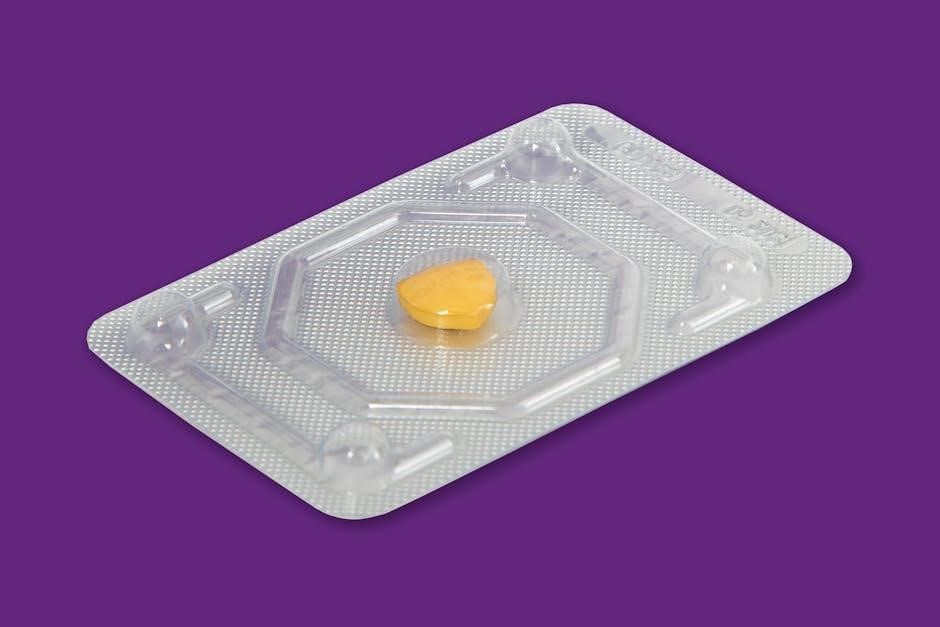Oral ivermectin is a popular anti-parasitic treatment for dogs, effective against heartworms and mange. Proper dosage calculation is crucial to ensure safety and effectiveness, minimizing health risks for your pet.
What is Ivermectin and Its Role in Canine Health
Ivermectin is a broad-spectrum anti-parasitic medication widely used in veterinary medicine. It is effective against a variety of parasites, including heartworms, roundworms, and mites. Approved for use in dogs, ivermectin works by binding to glutamate-gated chloride channels in parasites, leading to their paralysis and death. It is particularly valued for its ability to treat demodectic mange and prevent heartworm infections. While safe at recommended doses, ivermectin can cause toxicity in certain breeds or when overdosed. Its role in canine health is vital for maintaining parasite control and ensuring the overall well-being of dogs.
Why Proper Dosage Calculation is Critical
Proper dosage calculation is essential to ensure the safety and effectiveness of ivermectin treatment in dogs. Incorrect dosing can lead to toxicity, which may cause severe health issues, including seizures, tremors, and even death. Conversely, underdosing may fail to eliminate parasites, leading to treatment resistance. Factors like the dog’s weight, breed, and health status significantly influence the safe and effective dose. Using a dosage calculator tailored for dogs helps minimize risks and ensures the medication works as intended. Accurate calculation is vital to protect your dog from potential harm while effectively treating parasites.

Understanding the Factors Influencing Dosage
Weight, breed, and health status are critical factors in determining the correct ivermectin dosage for dogs. Accurate calculation ensures safety and effectiveness. Proper consideration of these elements helps prevent toxicity and ensures therapeutic efficacy.
Weight-Based Dosage Requirements
Weight is the primary factor in determining oral ivermectin dosage for dogs. The standard range is 0.1-0.2 mg/kg for dogs under 15 lbs, 0.2-0.4 mg/kg for 15-30 lbs, and 0.4-0.6 mg/kg for 30-60 lbs. Accurate weight measurement is crucial to avoid underdosing or overdosing. Dosage calculators simplify this process by converting weight into the correct milligram or milliliter measurement. For example, a 25lb dog requires 68mcg for heartworm prevention. Always use a precise scale and consult a dosage chart or calculator to ensure accurate administration and prevent potential toxicity risks. Proper calculation is vital for your dog’s safety and treatment efficacy.
Breed and Health Status Considerations
Certain dog breeds, such as Collies and other herding breeds, are more sensitive to ivermectin due to genetic factors, requiring lower dosages to avoid toxicity. Health status also plays a role; dogs with liver or kidney issues may need adjusted dosages. Puppies, pregnant dogs, and elderly pets should be treated with caution. Consult a veterinarian to determine the safest and most effective dosage for your dog, especially if they have pre-existing conditions or are on other medications. Breed-specific sensitivity and health conditions must be considered to prevent adverse reactions and ensure proper treatment outcomes.

Step-by-Step Guide to Calculating Oral Ivermectin Dosage
Determine your dog’s weight in pounds or kilograms. 2. Consult a dosage chart or calculator. 3. Calculate based on weight and condition being treated. Always follow veterinary guidance for accuracy.

Using a Dosage Calculator for Accuracy
A dosage calculator simplifies determining the correct ivermectin dose for dogs. Enter your dog’s weight in pounds or kilograms, select the desired dosage range (e.g., 0.1-0.2 mg/kg), and the calculator provides the exact amount needed. This tool ensures precision, minimizing the risk of underdosing or overdosing. Many calculators also account for factors like the type of infection being treated. Always verify the calculator’s accuracy and consult your veterinarian, especially for breeds sensitive to ivermectin. Proper use of a dosage calculator is essential for safe and effective treatment, ensuring your dog receives the right amount for their specific needs.
Converting Units and Applying the Correct Formula
Accurate unit conversion is vital for calculating ivermectin dosage. Convert your dog’s weight from pounds to kilograms by dividing by 2.2. Use the formula: dosage (mg) = weight (kg) × recommended mg/kg. For liquid ivermectin, convert mg to mL using the solution’s concentration (e.g., 0.1 mg/mL). For example, a 10kg dog at 0.3 mg/kg needs 3mg, or 0.03 mL (0.15 cc). Always double-check calculations to avoid overdosing, as ivermectin toxicity can occur. Use a calculator or consult a vet for precise results, ensuring safe and effective treatment for your dog.
Safety and Precautions
Always prioritize safety when administering ivermectin to dogs. Avoid overdosing, as it can lead to severe health risks, including toxicity. Monitor for signs like dizziness or confusion closely.
Understanding the Risks of Overdose

Overdosing on ivermectin can pose serious health risks to dogs, including toxicity. Symptoms may include loss of balance, nausea, dizziness, cramping, confusion, and, in severe cases, seizures or even death. While many dogs recover with proper care, the potential for fatal outcomes underscores the importance of precise dosing. Always adhere to recommended guidelines and consult a veterinarian, especially for breeds sensitive to ivermectin. Accurate calculation using a dosage calculator is essential to avoid such risks and ensure your dog’s safety.
Signs of Ivermectin Toxicity in Dogs
Signs of ivermectin toxicity in dogs include loss of balance, nausea, dizziness, cramping, confusion, and in severe cases, seizures or coma. Overdose can lead to respiratory failure or death. Symptoms may appear within hours of ingestion. Herding breeds, such as collies, are particularly sensitive due to genetic factors. Monitoring for these signs is crucial, as early veterinary intervention can improve outcomes. If toxicity is suspected, immediate professional care is essential to prevent life-threatening complications. Always follow dosage guidelines to avoid such risks and ensure your dog’s well-being.

Common Dosage Charts and Guidelines
Common dosage charts provide weight-based guidelines for ivermectin administration, ensuring accurate treatment. These charts help pet owners determine the correct dosage, preventing under or overmedication. Always consult a veterinarian for precise calculations.
Standard Dosage Ranges for Different Conditions
Ivermectin dosages for dogs vary by condition. For heartworm prevention, typical dosages range from 0.0027 to 0.034 mg per pound of body weight. Mange treatment often requires higher doses, between 0.03 to 0.06 mg per pound. Intestinal parasites may be treated with 0.05 mg per pound. These ranges ensure targeted treatment while minimizing risks. However, exact dosages depend on the severity of the condition and the dog’s health. Always consult a veterinarian for precise calculations to avoid under or overmedication, ensuring safe and effective treatment.
How to Interpret a Dosage Chart
Interpreting an ivermectin dosage chart involves matching your dog’s weight to the recommended dose for their specific condition. Start by locating your dog’s weight on the chart, then cross-reference it with the condition being treated. Dosage ranges are typically provided in micrograms (mcg) or milligrams (mg) per pound or kilogram of body weight. Ensure you understand the units and whether the dosage is per day or as a single treatment. Always double-check the calculations to avoid over or underdosing. If unsure, consult a veterinarian to confirm the correct dosage, ensuring safe and effective treatment for your dog.
Practical Administration Tips
For accurate dosing, use a syringe to measure liquid ivermectin, ensuring precision. Mix with a small amount of food or water to facilitate easy ingestion. Always follow the calculated dosage and consult a veterinarian if unsure. Proper administration ensures effectiveness and minimizes potential side effects, keeping your dog safe and healthy.
Methods for Administering Oral Ivermectin
Administering oral ivermectin to dogs requires precision and care. Use a syringe to measure the exact dose, ensuring accuracy. For liquid formulations, mix the medication with a small amount of food or water to facilitate easy swallowing. Some owners prefer diluting ivermectin with glycerin to create a more manageable solution. Always administer the dose directly into the dog’s mouth to prevent spillage. For larger breeds, divide the dose into smaller portions to ease ingestion. Proper administration techniques help minimize stress for the dog and ensure the medication is effective. Always follow the calculated dosage and consult a veterinarian if unsure.
Ensuring Compliance and Effectiveness
Accurate dosing and consistent administration are key to ensuring compliance and effectiveness. Use a syringe or measuring device to deliver the exact calculated dose, avoiding spills or underdosing. Administer the medication at the same time daily to maintain routine. Monitor your dog’s health and parasite levels to assess treatment success. Store ivermectin in a secure location to prevent accidental ingestion. Keep a treatment schedule to track progress and ensure completion of the prescribed course. Regular follow-ups with a veterinarian are essential to confirm effectiveness and adjust dosages as needed, ensuring your dog’s safety and well-being throughout the treatment process.
Proper use of oral ivermectin in dogs requires precise dosing and veterinary guidance to ensure safety and effectiveness, preventing parasitic infections while safeguarding your pet’s health.

Final Thoughts on Responsible Ivermectin Use
Responsible use of oral ivermectin for dogs involves careful dosage calculation, adherence to veterinary guidance, and awareness of potential risks. Proper dosing ensures effectiveness while minimizing toxicity risks, which can be fatal in severe cases. Always consult a veterinarian to confirm the correct dosage and treatment plan tailored to your dog’s specific needs, especially for breeds sensitive to ivermectin. Avoid self-prescribing, as improper use can lead to adverse reactions. Regular monitoring and adherence to prescribed regimens are crucial for your dog’s safety and the medication’s effectiveness in treating parasites.
Importance of Veterinary Consultation
Consulting a veterinarian is essential before administering oral ivermectin to dogs. They ensure the correct dosage, considering factors like weight, breed, and health status, to prevent overdose risks. Vets can also confirm the diagnosis and recommend alternative treatments if necessary. Self-prescribing ivermectin without professional guidance can lead to toxicity or ineffective treatment. Veterinarians provide personalized advice, reducing the risk of adverse reactions, especially in sensitive breeds. Their expertise ensures safe and effective parasite control, making them an indispensable resource for responsible ivermectin use in canine care.